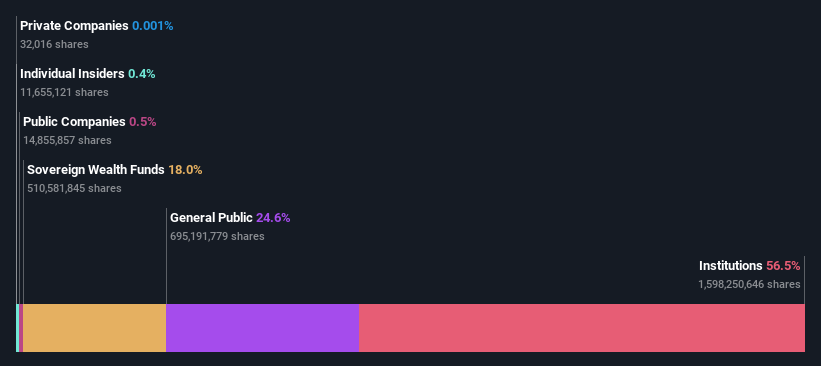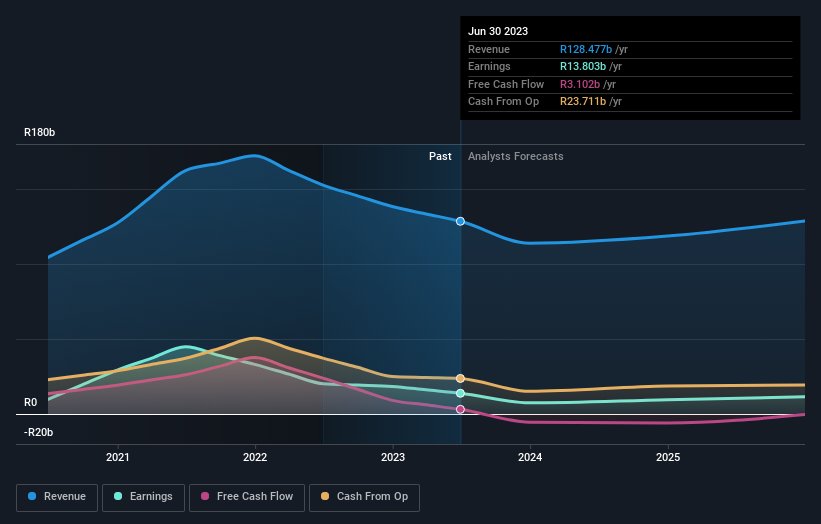Following a 42% decline over last year, recent gains may please Sibanye Stillwater Limited (JSE:SSW) institutional owners
Key Insights
Significantly high institutional ownership implies Sibanye Stillwater's stock price is sensitive to their trading actions
50% of the business is held by the top 8 shareholders
Insiders have been buying lately
If you want to know who really controls Sibanye Stillwater Limited (JSE:SSW), then you'll have to look at the makeup of its share registry. The group holding the most number of shares in the company, around 56% to be precise, is institutions. Put another way, the group faces the maximum upside potential (or downside risk).
After a year of 42% losses, last week’s 6.7% gain would be welcomed by institutional investors as a possible sign that returns might start trending higher.
Let's take a closer look to see what the different types of shareholders can tell us about Sibanye Stillwater.
View our latest analysis for Sibanye Stillwater

What Does The Institutional Ownership Tell Us About Sibanye Stillwater?
Institutions typically measure themselves against a benchmark when reporting to their own investors, so they often become more enthusiastic about a stock once it's included in a major index. We would expect most companies to have some institutions on the register, especially if they are growing.
We can see that Sibanye Stillwater does have institutional investors; and they hold a good portion of the company's stock. This suggests some credibility amongst professional investors. But we can't rely on that fact alone since institutions make bad investments sometimes, just like everyone does. If multiple institutions change their view on a stock at the same time, you could see the share price drop fast. It's therefore worth looking at Sibanye Stillwater's earnings history below. Of course, the future is what really matters.

Since institutional investors own more than half the issued stock, the board will likely have to pay attention to their preferences. Sibanye Stillwater is not owned by hedge funds. Public Investment Corporation Limited is currently the company's largest shareholder with 18% of shares outstanding. Allan Gray Proprietary Ltd. is the second largest shareholder owning 6.8% of common stock, and Lingotto Investment Management LLP holds about 6.7% of the company stock.
We also observed that the top 8 shareholders account for more than half of the share register, with a few smaller shareholders to balance the interests of the larger ones to a certain extent.
While it makes sense to study institutional ownership data for a company, it also makes sense to study analyst sentiments to know which way the wind is blowing. There are plenty of analysts covering the stock, so it might be worth seeing what they are forecasting, too.
Insider Ownership Of Sibanye Stillwater
The definition of an insider can differ slightly between different countries, but members of the board of directors always count. The company management answer to the board and the latter should represent the interests of shareholders. Notably, sometimes top-level managers are on the board themselves.
Insider ownership is positive when it signals leadership are thinking like the true owners of the company. However, high insider ownership can also give immense power to a small group within the company. This can be negative in some circumstances.
Our most recent data indicates that insiders own less than 1% of Sibanye Stillwater Limited. It's a big company, so even a small proportional interest can create alignment between the board and shareholders. In this case insiders own R299m worth of shares. Arguably, recent buying and selling is just as important to consider. You can click here to see if insiders have been buying or selling.
General Public Ownership
The general public, who are usually individual investors, hold a 25% stake in Sibanye Stillwater. This size of ownership, while considerable, may not be enough to change company policy if the decision is not in sync with other large shareholders.
Next Steps:
It's always worth thinking about the different groups who own shares in a company. But to understand Sibanye Stillwater better, we need to consider many other factors. Consider for instance, the ever-present spectre of investment risk. We've identified 3 warning signs with Sibanye Stillwater (at least 1 which is significant) , and understanding them should be part of your investment process.
But ultimately it is the future, not the past, that will determine how well the owners of this business will do. Therefore we think it advisable to take a look at this free report showing whether analysts are predicting a brighter future.
NB: Figures in this article are calculated using data from the last twelve months, which refer to the 12-month period ending on the last date of the month the financial statement is dated. This may not be consistent with full year annual report figures.
Have feedback on this article? Concerned about the content? Get in touch with us directly. Alternatively, email editorial-team (at) simplywallst.com.
This article by Simply Wall St is general in nature. We provide commentary based on historical data and analyst forecasts only using an unbiased methodology and our articles are not intended to be financial advice. It does not constitute a recommendation to buy or sell any stock, and does not take account of your objectives, or your financial situation. We aim to bring you long-term focused analysis driven by fundamental data. Note that our analysis may not factor in the latest price-sensitive company announcements or qualitative material. Simply Wall St has no position in any stocks mentioned.

 Yahoo Finance
Yahoo Finance 